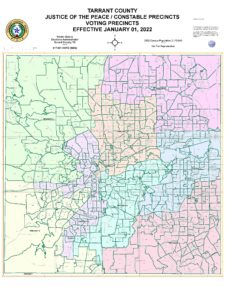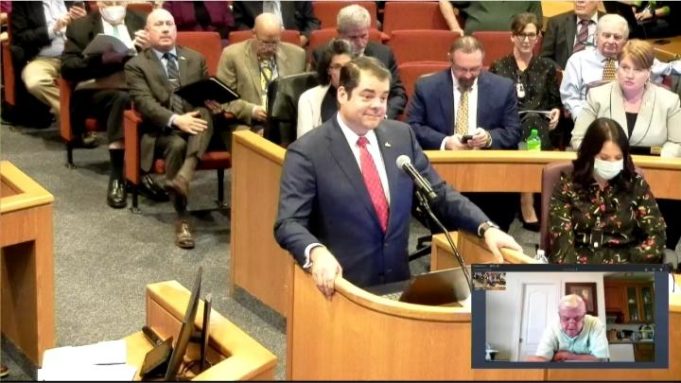Despite a voting boycott and threats of lawsuits, the majority Republican members of Tarrant County’s commissioners court got their way.
No major news outlets reported on the conservatives’ decision to gerrymander voting precincts to benefit Republican Justices of the Peace and constables, though what the five-member court does affects around 2 million people.
Now there are lawsuits.
Over the course of 90 minutes on Nov. 9, five white Republican JPs presented to the commissioners a plan for an eight-precinct map that redrew the boundaries that define where the county’s eight JPs and eight constables could run for office and serve. The map was presented to the county’s three ethnic minority JPs only the day before the meeting. It quickly drew objections from the snubbed elected officials, who allege the map is a ploy to dilute the voting power of minorities and eliminate political challengers for two Republican JPs ahead of next year’s county elections.
The final 3-1 vote by the commissioners — Devon Allen, one of two Black commissioners, abstained — to adopt the map will now be the subject of at least two lawsuits filed by local attorney Steve Maxwell.
“Frankly, it is shameful that the Republican commissioners and JPs schemed to put a boundary-change map together without following the protocol used in the past, whereby all of the affected parties could evaluate those changes and make proposals based on community input,” Maxwell told us.
The lawsuit will be filed in a Tarrant County court today or Monday at the latest, Maxwell added, with JP Sergio De Leon as the plaintiff. Ethnic minority De Leon has standing in court because his district was redrawn without his input or approval.
The legal action, Maxwell continued, is based on the fact that the five JPs were not following the proper protocol for presenting the changes to the public for them to be debated before they were adopted.
“There are certain things that the [the JPs] should have done as far as how the changes were presented for debate,” Maxwell said. “There are discrepancies between what the commissioners passed and” the final map that followed.
The county did not respond to repeated requests for comment.
A spokesperson for JP Jason Charbonnet, who represents Precinct 6 and co-authored the map, said Charbonnet is not commenting to the media on matters related to the recent redistricting.
During the Nov. 9 commissioners court meeting, Charbonnet described the reasons that the five JPs redrew the precinct map.
“The 2010 population of Tarrant County was 1.8 million,” he said. “In 2020, it sits at over 2.1 million. That’s 16% growth in the last decade. Tarrant County is now the third most populous county in Texas. Our current precincts have become inequitable. The formula that was used is very simple. We asked the judges to identify high-density caseload precincts and provide their precinct numbers. Those voting precincts were looked at and were distributed to precincts that had a lower volume of cases. This will allow the workflow to be balanced among the eight justices of the peace precincts as much as possible.”
The proposed map, Charbonnet added, maintains the integrity of minority districts.

“I am upset at the lack of integrity in the process,” De Leon said during the meeting. The Republican/white JPs who put forth the changes “have not talked to any minority JPs [about] who put this map together [and] not one minority constable about what they thought about this map. It is disrespectful to us as leaders, especially the thousands that we represent. What I feel like is that communities of color have been disrespected.”
In addition to three ethnic minority JPs, Tarrant County has four minority constables.
The fact that two JPs have removed political opponents by drawing the contenders’ homes out of the precincts where they wish to run, De Leon said in his final remarks, should “raise eyebrows.”
During the meeting, Commissioner Allen asked an attorney for the county to describe the legality of the proposed map.
Precinct 2 “is the one that has the most voting rights impact,” the lawyer told the commissioners court. “It was a district that was politically competitive. [The new map] has had a significant impact on the racial balance. It looks as if it may not be nearly as competitive in the future.”
When asked by a commissioner if the new maps appear to be an attempt at retrogression, the legal standard that opens gerrymandered maps to federal lawsuits, the county attorney said yes.
Soon after, Commissioner Gary Fickes motioned for a vote, which was seconded by Commissioner JD Johnson.
“We have a motion and a second,” commissioner court head Glen Whitley said as Allen and Commissioner Roy Brooks, the other Black commissioner, stood and left the meeting in protest and to deny the commissioners a quorum. Brooks later returned to log a no vote and to warn of pending litigation against the map. There was noticeable confusion on the part of county staff as to whether the vote was legitimate.
“The discussion meant nothing,” lawyer Maxwell said. “They knew they had a 3-2 majority.”
If the commissioners discussed the outcome of the vote with the five JPs outside of a public meeting, the lawyer said, those conversations may constitute a violation of Texas’ Open Meetings Act, the state law that requires elected officials to discuss matters of public interest during open forums only and not privately.
In the coming weeks, Maxwell and his team will file a federal lawsuit to determine the constitutionality of the new JP/constables map.
“We will be filing a federal Voting Rights Act lawsuit under Section 2” of that act, he said, referring to the section that protects minority representation during redistricting.
JP De Leon could not be reached for comment by press time.












